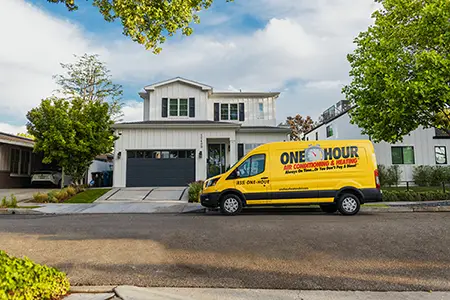 Your air conditioner’s capacitor is a small, cylindrical component. Installed in your outdoor condenser unit, it looks much like an unlabeled soda can. AC capacitors have two leads on one end that harness and distribute electricity. When your air conditioner starts up and during its cooling cycles, it needs far more energy than your electrical panel can supply. The AC capacitor harnesses this energy and provides it in powerful, measured bursts.
Your air conditioner’s capacitor is a small, cylindrical component. Installed in your outdoor condenser unit, it looks much like an unlabeled soda can. AC capacitors have two leads on one end that harness and distribute electricity. When your air conditioner starts up and during its cooling cycles, it needs far more energy than your electrical panel can supply. The AC capacitor harnesses this energy and provides it in powerful, measured bursts.
Your Air Conditioner Might Have Two Capacitors
Some air conditioners have two capacitors: a run capacitor and a start capacitor. All capacitors have expected lifespans of five to 20 years. If your air conditioner won’t start up, it may have a faulty start capacitor. If your air conditioner starts but can’t initiate or complete a cooling cycle, the problem likely lies with your run capacitor.
Other air conditioners have dual capacitors. Dual capacitors perform both jobs. They deliver several jolts of energy to rev up blower motors at the start of cooling cycles. Then they dial their current down and power ACs until cooling cycles end.
Why You Should Consider Upgrading to a Dual Capacitor
Given that run and start capacitors have identical, average lifespans, if only one of your capacitors fails, it’s best to have both replaced. This way, you won’t need to schedule another repair service just several weeks or months down the road.
Many HVAC companies consider dual capacitors superior to run and start capacitors. They combine both functions in a single, easy-to-install unit. They cost a bit more than a run or start capacitor, but they cost less than both run and start capacitors together. If you want to save time and money on future capacitor replacements, One Hour Air Conditioning & Heating can replace your run and start capacitors with a dual capacitor.
What Causes AC Capacitors to Break Down?
AC capacitors put in lots of hard work. All of the electrical current that drives air conditioners passes through them. However, in a subtropical climate like Bradenton’s, excess humidity takes a special toll. Excess humidity and high temperatures degrade the metal edges of capacitor electrodes. High humidity also decreases a capacitor’s ability to store and distribute electricity over time.
Other factors that can decrease the lifespan of an AC capacitor include:
- Strong or recurring power surges
- Overheating ACs
- Short circuits
When your air conditioner runs hot or experiences greater-than-normal stress due to poor maintenance or delayed repairs, your capacitor suffers for it.
Is There Any Way to Extend the Lifespan of an AC Capacitor?
In areas like Bradenton, high humidity is the number one cause of capacitor failure. However, you may be able to extend the service life of your capacitor by installing a high-quality unit, hiring a detail-oriented HVAC company to handle this installation, and keeping your air conditioner well-maintained. To protect your capacitor from the cumulative damages caused by power surges, it’s also best to install whole-house surge protection and keep your home’s electrical system updated.
What Are the Signs of a Faulty AC Capacitor?
For our technicians, faulty AC capacitors are often easy to spot. As these components break down, they tend to swell and bulge. This is especially true in humid climates. However, there are also several ways to identify a failed capacitor through changes in indoor conditions and your air conditioner’s performance:
- Failed startup
- Frequent shutdowns
- Smoke and smoke odors near your condenser
- Loud humming sounds coming from the condenser
- Short, unproductive cooling cycles
- Warm air coming from your air vents
When run AC capacitors break down, AC compressors can’t get enough power to fully pressurize and depressurize refrigerant, and they struggle to pump refrigerant to and from indoor air handlers.
Is It Safe to Replace My AC Capacitor on My Own?
From all outward appearances, AC capacitors are fairly simple components. However, attempting to replace your capacitor rather than hiring a licensed HVAC company could result in serious injury or death. These components are not batteries. More importantly, they’re not automatically de-energized when you shut your air conditioner’s circuit breaker off. Attempting to disconnect and remove a defunct capacitor on your own will put you at high risk of potentially fatal electrocution.
If your air conditioner is still under warranty, DIY repairs can also result in your warranty’s cancellation. The mutually binding terms of AC manufacturers’ warranties strictly prohibit consumers from tampering with moving or electrical components.
For safe and convenient AC capacitor replacement, give One Hour Air Conditioning & Heating a call. We stock an impressive selection of quality AC replacement parts, and we install them to manufacturer specifications.